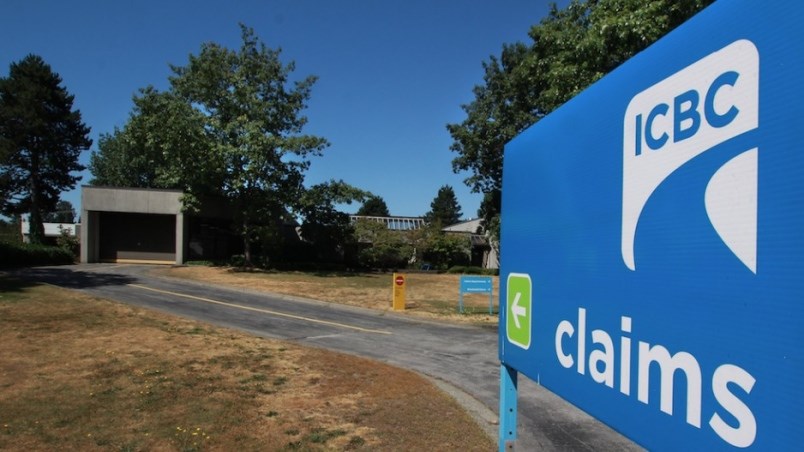VANCOUVER — A judge has certified a class-action lawsuit against the Insurance Corp. of B.C. for accident claimants who are alleging they were shortchanged in their benefits because of a scheme dating back decades.
In March 2020, the lawsuit filed in B.C. Supreme Court alleged that ICBC and the B.C. government were engaged in an illegal scheme to divert hundreds of millions of dollars, resulting in losses to accident victims and driving up insurance rates for drivers.
The suit argued that provincial laws make the government, through the Medical Services Plan — and not ICBC — responsible for paying the costs of visits to physicians by victims of motor vehicle accidents.
It claimed that ICBC has instead for decades been reimbursing the government, through the MSP, for the services of medical practitioners payable as a result of ICBC claims.
The alleged effect for the government of receiving the remittances — estimated to be nearly $900 million from 1988 to 2018 — was to raid ICBC’s budget for its own benefit, and in doing so increase ICBC’s operating costs.
There were two identified classes in the lawsuit, those in the accident victim class and those in the ratepayers class.
In his ruling on the case, Justice Nathan Smith certified the accident victim class but declined to certify the ratepayers class, the latter of which involves the $900-million diversion allegation.
Brayden Methot, a Williams Lake man who is the representative plaintiff in the accident victim class, had been rendered a quadriplegic in a motor vehicle accident in June 2014.
In April 2015, ICBC advised him that he had reached the limit of his accident benefits, which at the time was $150,000.
He subsequently learned that he had lost $3,709.43 after ICBC paid that amount to MSP from his accident benefits.
Court heard that ICBC has sent him a cheque for that amount, but at the time of trial he had not cashed the cheque.
In its response to the lawsuit, ICBC said it had a policy under which it did not reduce the coverage limit for accident benefits by the amount of MSP payments.
But the judge noted that the evidence of Methot and others clearly indicated that the policy had not been followed in all cases.
Affidavits from an ICBC official indicated that the policy was applied in a majority of cases, but there were 275 instances where it appeared not to have been applied or not applied correctly.
Just how many accident victims will benefit from the ruling and how much they might get is not expected to be known until the plaintiffs get discovery and disclosure from ICBC.
Regarding the ratepayers class, which involved everyone who has had an ICBC policy, the judge noted that the NDP government had recently introduced legislation that he said was clearly intended to pre-empt those claims.
He declined to certify the ratepayers class after finding that the one remaining issue — a claim by the plaintiffs of unconstitutional taxation — was doomed to fail and would have been doomed to fail even in the absence of the new legislation.
In an email, Scott Stanley, a lawyer for the plaintiffs, said that in 1994 the NDP government had created a complex scheme that forced ICBC to charge MSP expenses to accident victims and give this money to the province.
“This scheme deprived the most seriously injured people of the full benefits they were lawfully entitled to,” said the Vancouver lawyer. “The scheme enabled the province to remove millions of dollars from ICBC from health-care costs already covered by payments the province had received from taxes collected by the federal government.”
Stanley said that British Columbians who purchased ICBC insurance paid twice for the same health-care costs.
“This lawsuit publicly confronted the province about the double payments. The NDP government responded by passing legislation seeking to legitimize this scheme without accounting to the public for the money it had taken from ICBC.
“Accident victims who had money taken from them by the province and ICBC will now be able to pursue their claims in a class-action.”
In an email, a spokesman for ICBC said the auto insurer was “pleased” that the ratepayer claim was dismissed.
“We’re reviewing the decision on the accident victim class claim.”



